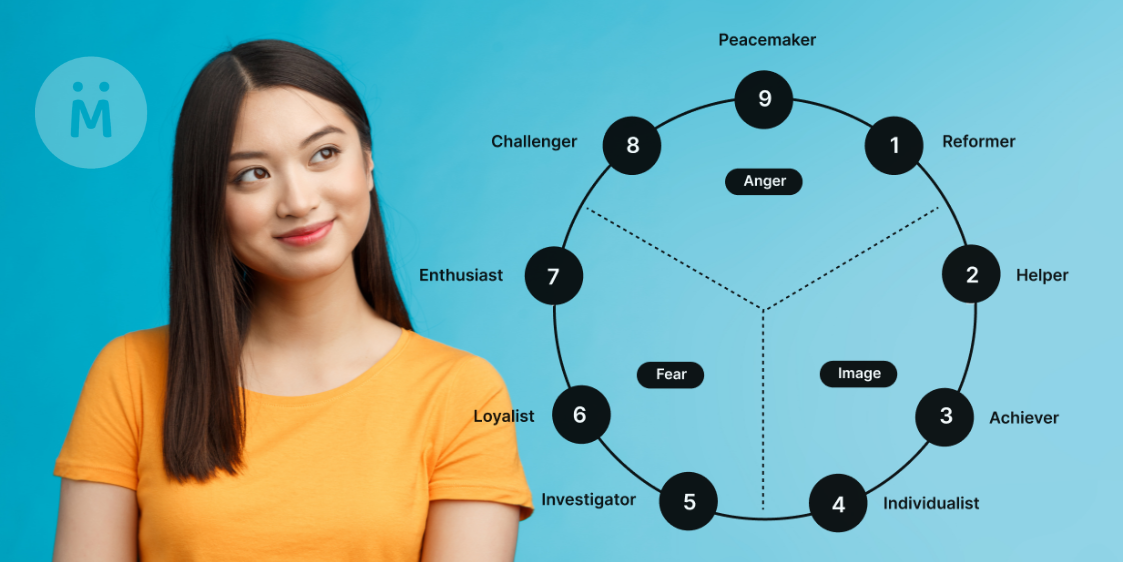Understanding Enneagram Types: A Comprehensive Guide
Margo Plater

Introduction
Are you someone who is always interested in learning about human behavior and personality traits? If yes, then you must have heard about the Enneagram personality system, derived from the Enneagram test. Enneagram is a powerful tool that helps you to understand different personality types and their motivations.
In this article, we will be discussing the Enneagram system in detail. You will learn about the nine different Enneagram types and their unique characteristics. We will also provide you with some tips on how to identify your Enneagram type. So, let's dive in and explore the world of Enneagram.
What is the Enneagram Personality System?
The Enneagram personality system is a powerful psychometrics tool for understanding human behavior. It is based on the idea that there are nine basic personality types, and each type has a specific set of characteristics and motivations. Enneagram helps you to understand your personality type, your strengths, weaknesses, and fears in order to foster personal growth.
The word "Enneagram" comes from the Greek words "ennea" (meaning nine) and "grammos" (meaning a figure or a drawing). The Enneagram system consists of a circle with nine points, and each point represents a different personality type.
The Nine Enneagram Types
Type 1: The Perfectionist
Type 1 individuals are often known as perfectionists. They have a strong sense of right and wrong and are always striving to do things correctly. They are highly self-disciplined and tend to be critical of themselves and others.
Type 2: The Helper
Type 2 individuals are caring and generous people who love to help others. They are empathetic and sensitive to the needs of others. They have a strong desire to be liked and appreciated.
Type 3: The Achiever
Type 3 individuals are ambitious and highly driven. They are often successful in their careers and are highly competitive. They have a strong desire to be recognized for their achievements.
Type 4: The Individualist
Type 4 individuals are creative and unique. They often feel misunderstood and different from others. They have a strong desire to express themselves and their emotions.
Type 5: The Investigator
Type 5 individuals are analytical and intellectual. They are highly curious and enjoy learning new things. They tend to be introverted and prefer spending time alone.
Type 6: The Loyalist
Type 6 individuals are loyal and dependable. They value security and stability and are often anxious and fearful. They seek guidance and support from others.
Type 7: The Enthusiast
Type 7 individuals are fun-loving and adventurous. They have a strong desire for new experiences and tend to be optimistic and positive. They tend to avoid pain and discomfort.
Type 8: The Challenger
Type 8 individuals are strong-willed and assertive. They have a strong desire for control and can be confrontational. They are often seen as leaders.
Type 9: The Peacemaker
Type 9 individuals are easygoing and agreeable. They value peace and harmony and tend to avoid conflict. They have a strong desire for stability and balance.
Each Enneagram type has its unique set of strengths and weaknesses. Understanding your Enneagram type can help you to identify areas for personal growth and development.
Identifying Your Enneagram Type
Identifying your Enneagram type can be a challenging process. It requires self-reflection, honesty, and a willingness to explore your fears and motivations. Here are some tips that can help you to identify your Enneagram type:
1. Read about each Enneagram type
Start by reading about each Enneagram type. You may find that you resonate with certain characteristics or behaviors more than others.
2. Take an Enneagram test
Taking an Enneagram test can be a helpful way to identify your Enneagram type, one way is by taking Maslow's free Enneagram Test. You may prepare for the test however it is not necessary. Keep in mind that Enneagram tests are not always accurate, so it's essential to use the results as a starting point for self-reflection.
3. Reflect on your fears and motivations
Reflect on your stressors, fears, and motivations. What drives you? What are your deepest fears? Identifying your fears and motivations can help you to identify your Enneagram type.
Understanding Enneagram Types for Personal Growth Key Takeaway
In conclusion, understanding Enneagram types can be a powerful tool for personal growth and development. By identifying your Enneagram type, you can gain insight into your patterns of behavior, fears, and motivations. This self-awareness can help you to make positive changes in your life and relationships.
Remember, the Enneagram is not a one-size-fits-all approach to personality. Each individual is unique, and Enneagram types are simply a tool for self-reflection and personal growth.
So take the time to explore and reflect on your Enneagram type. Use it as a starting point for personal growth, and remember to approach the process with self-compassion and an open mind.
Resources
- Enneagram Worldwide. "The Narrative Enneagram." https://www.enneagramworldwide.com/
- Enneagram Explorations. "The Enneagram in Personal Growth and Development." https://www.enneagram.net/
- The Enneagram Spectrum. "Discovering the Enneagram." https://www.enneagramspectrum.com/
- Enneagram Podcast. "The Enneagram Journey Podcast." https://www.enneagramjourney.org/podcast/
- Enneagram Monthly. "Typology Podcast." https://www.typologypodcast.com/



